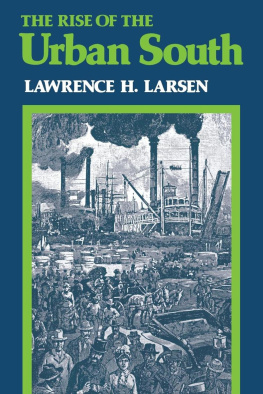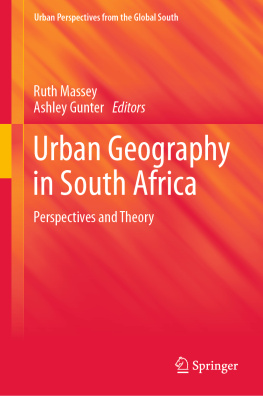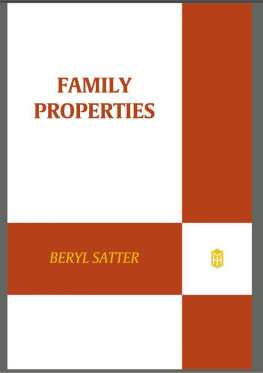2010 The University of North Carolina Press
All rights reserved. Designed by Courtney Leigh Baker and set in Merlo with URW Grotesk display by Rebecca Evans. Manufactured in the United States of America. The paper in this book meets the guidelines for permanence and durability of the Committee on Production Guidelines for Book Longevity of the Council on Library Resources. The University of North Carolina Press has been a member of the Green Press Initiative since 2003.
Library of Congress Cataloging-in-Publication Data
Adams, Luther.
Way up north in Louisville: African American migration in the urban South, 19301970/
Luther Adams.
p. cm.(The John Hope Franklin series in African American history and culture)
Includes bibliographical references and index.
ISBN 978-0-8078-3422-0 (cloth : alk. paper)
ISBN 978-1-4696-1894-4 (pbk. : alk. paper)
1. African AmericansKentuckyLouisvilleHistory20th century. 2. African AmericansKentuckyLouisvilleSocial conditions20th century. 3. African AmericansCivil rightsKentuckyLouisvilleHistory20th century. 4. Civil rights movementsKentuckyLouisvilleHistory20th century. 5. Civil rights movementsSouthern StatesHistory20th century. 6. African AmericansMigrationsHistory20th century 7. Migration, InternalSouthern StatesHistory20th century. 8. Rural-urban migrationSouthern StatesHistory20th century. I. Tide.
F459.L89N427 2010 307.208996073076944dc22 2010023647
One-Way Ticket from The Collected Poems of Langston Hughes by Langston Hughes, edited by Arnold Rampersad with David Roessel, Associate Editor, copyright 1994 by the Estate of Langston Hughes. Used by permission of Alfred A. Knopf, a division of Random House, Inc., and Harold Ober Associates.
Portions of the text have previously been published as Headed to Louisville: Rethinking Rural to Urban Migration in the South, 19301950, Journal of Social History 40, no. 2 (Winter 2006): 40730; It Was North of Tennessee: African American Migration and the Meaning of the South, Ohio Valley History 3, no. 3 (Fall 2003): 3752; and African American Migration to Louisville in the Mid-Twentieth Century, Register of the Kentucky Historical Society 99, no. 4 (Autumn 2001): 36384. Used with permission.
cloth 14 13 12 11 10 5 4 3 2 1
paper 18 17 16 15 14 5 4 3 2 1
ACKNOWLEDGMENTS
My family has lived in Kentucky for over 150 years, with the earliest arrivals coming as slaves from Virginia in the 1830s. For generations, there have been Markses, Adamses, Overstreets, Govers, and Grays who have worked, raised families, fellowshipped at churches, and watched basketball with a passion. In doing so they made Kentucky their own. Collectively, they taught me the importance and the power of place. Across the years, some family members have left and returned, while some just left and others never left at all. For some, there was too much racism and too little opportunity. Yet, for all of us, Kentucky has always been home. This book is dedicated to my family, and to my mother and father.
As a graduate student at the University of Pennsylvania, I had the good fortune to be surrounded by a supportive and nurturing community of students and faculty. To my fellow students and friendsJacqueline Akins, Ed Baptist, Deborah Broadnax, Stephanie Camp, Shefali Chandra, Edda Fields, Rhonda Frederick, Kali Gross, Leticia Hernandez, Carmen Higgins, James Peterson, Hayley Thomas, Butch Ware, Monique Williams, Rhonda Y. Williams, and Raphael Zapatathank you all for your camaraderie. As faculty, Mary Frances Berry, Barbara Savage, Farah GrifHn, Drew Faust, Walter Licht, Robert Engs, Herman Beavers, Tom Sugrue, Lee Cassanelli, and Sumathi Ramaswamy provided guidance and help at an early stage in this project. I especially thank Drew Faust, for teaching me so much about teaching the history of the South; Farah GrifHn, for her kindness and aid with music and migration; Barbara Savage, for her generosity and guidance; and, above all, Mary Frances Berry for her insight and wisdom.
I would also like to give special thanks to John Cumbler, Mary Hawkes-worth, and Blaine Hudson, who, as faculty at the University of Louisville, helped broaden my horizons as an undergraduate student. I thank George C. Wright, whose work on blacks in Kentucky made studies like mine possible; also for his interest in my work and his willingness to review it over the years. I also thank Francille Wilson for all her sage advice since I first met her as a graduate student at the University of Pennsylvania. At the University of WashingtonSeattle I would like to thank Quintard Taylor for his aid and my colleagues at the University of WashingtonTacoma.
In 2006 and 2007 I spent a year at Carnegie Mellon University (CMU) as an African American Urban Studies Fellow at the Center for African American Urban Studies and the Economy. Not only did the fellowship allow me the time to make substantial progress toward completing this book, but also the warmth and wisdom of Joe Trotter, Tera Hunter, and Stephanie Batiste made my time at CMU an invaluable experience both personally and professionally. In addition, I was aided by the University of WashingtonTacoma's Faculty Scholarship Support Award. My work also greatly benefted from participating in the Harvard University, NEH (National Endowment for the Humanities) Summer Institute on African American Civil Rights, organized by Patricia Sullivan and Waldo Martin, whose stellar cast of faculty, activists, and facilitators helped refne my thinking on civil rights movements in the twentieth century. I thank Cheryl Hicks and Tiyi Morris for making the summer institute and that time in the Boston area both edifying and enjoyable.
I extend my deepest thanks to the numerous librarians and archivists who helped me along the way; without their assistance this book would have been impossible. I thank the entire staff at the University of Louisville Archives and Records Center, including Tom Owen and Professor John Anderson, who graciously donated his maps of Louisville for my use. I would like to express my appreciation to Carrie Daniels, Beth Shields, and Charlene Smith at the Kentucky Historical Society. The entire staff at the City Archives of Louisville (now the Louisville Metro Archives) provided indispensable support. In particular, Agnie Griffin helped locate urban renewal maps and put me in contact with Paul Vissman, who shared his knowledge of urban renewal in Louisville. Amy Inskeep at the





